Greenhouse gas (GHG) emissions continue to decline in France. A drop of 4.6% (excluding carbon sinks) was recorded over the first nine months of 2023 compared to the same period of 2022, Citepa announced on Tuesday. “Three sectors contribute the most to this decline: industry (-9.3%), energy production (-9.4%) and buildings (-7.5%). Transport contributes more modestly to this downward trend (-1.8%)”, indicates the organization mandated to carry out the French inventory of emissions and which publishes a pre-estimate for the period.
Over the first half of the year, the drop was already 4.3%, after a decline of 2.7% over the whole of 2022. In May, France announced that it wanted to reduce its GHG emissions by 50% (- 55% “net”, if we include carbon sinks (soils and forests) in 2030 compared to the 1990 level, in accordance with European commitments, which implies doubling the rate of reduction in emissions.
Progress in means of electricity production
The industrial sector is “strongly impacted by the energy crisis in 2023”, underlines Citepa in a press release. For energy production, the decline in GHGs results in particular from the progression of decarbonized means of electricity production, in particular nuclear power plants (+ 11.4% linked to the gradual recommissioning of power plants) and hydroelectric power plants, coupled with a decrease of the production of thermal power plants (-23%), underlines Citepa.
For GHGs from the building sector, the drop in emissions linked to heating, already observed in 2022, continued in 2023, despite a slightly more severe winter. “GHG emissions from heating, domestic hot water and domestic cooking between the first nine months of 2022 and those of 2023 fell by 7.5%, with in particular a drop in natural gas consumption which continued in the third quarter, i.e. -8 .9% over the first three quarters of 2023 compared to 2022,” indicates Citepa.
For transport, the post-Covid rebound in road transport (+ 12% in 2021, + 2% in 2022) gave way to a slight decline (-2.7%) over the first nine months of 2023, with a notable drop in September (-10%).
Air transport emissions on the rise
On the other hand, air transport continues to see its emissions increase: + 21% for domestic flights over the first nine months, and + 27% for international flights. Citepa specifies that the evolution of the agricultural sector “is not yet precisely pre-estimated”, recalling that in recent years its emissions have declined on average by 1.5% due to the reduction in the cattle herd.
“Similarly, the evolution of carbon sinks is difficult to predict,” specifies the organization. The latter, although essential to the reduction in net emissions, have been weakened for several years, preventing them from absorbing as much CO2 as before, particularly in connection with the deterioration in the state of French forests.
